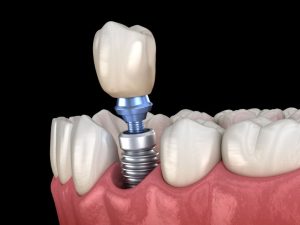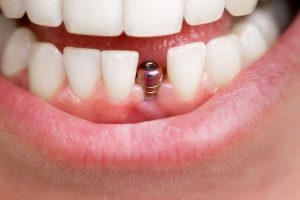If you have missing teeth, dental implants are typically considered the best way to replace them.
Many patients, however, are concerned that osteoporosis-related poor bone density excludes them from being viable candidates for dental implants.
In this article we’ll talk about osteoporosis and dental implants, including:
- How does osteoporosis affect dental implants?
- Can you have dental implants with osteoporosis?
- Reclast and dental implants
We hope this article will answer all the questions you may have about osteoporosis and teeth implants.
In This Article
Osteoporosis information
Osteoporosis is becoming a serious public health concern for 25 million Americans, with 80% of those affected being women. In the United States, it is estimated that 7 to 8 million people have the illness, with another 17 million having low bone density, putting them at risk for osteoporosis and the fractures it produces.
Osteoporosis is a complicated illness with many unknown causes. However, if you have specific risk factors, your chances of having osteoporosis increase.
What is osteoporosis and how does it affect you?
Osteoporosis is characterized by a decrease in bone mineral density (bone mass), which causes the bone to become more porous and hence weaker and more prone to breaking. Osteoporosis may proceed painlessly until a bone fractures if it is not avoided or treated.
Concerns about osteoporosis and teeth implants
Osteoporosis and poor bone mass may have an impact on a person’s oral health and should be taken into account when considering dental implants. Osteoporosis is a disorder in which your bones become porous and weak.

When your bones are frail and porous, it affects your entire body, including your jaw bone density. If you choose dental implants, the jaw bone is what should keep your teeth in place. As a result, osteoporosis is regarded as a risky condition for dental implant treatment.
Can you get dental implants if you have osteoporosis?
If you have osteoporosis, there are a few options for making your dental implants successful. If you have just a little bone loss in your jaw, dentists may recommend mini dental implants, or a bone transplant to help you build up enough jaw bone to support implants.
If you’re currently taking bisphosphonates for your osteoporosis, this drug may help to slow down the pace of bone loss. While this is beneficial in general, it may have the unintended consequence of causing your jaw to recover slowly following surgery.
Some bisphosphonate therapies have also been associated with implant failure, or the need for dental implant removal due to adverse effects.
In general, however, osteoporosis should not prevent you from receiving implants. Some research has shown that dental implants that are placed right after your teeth are removed have a greater success rate. If you have osteoporosis and desire dental implants, you should act as soon as possible, because at some point, it could be too late for dental implants.
If you’d like to find out more about this issue, you can read our guide to dental implants with bone loss.
Bisphosphonates and dental implants
Bisphosphonates, or Reclast, are a kind of medication used to prevent osteoporosis since they are known to slow down the deteriorating process while also minimizing bone thinning. Men and women are given the medicine, although postmenopausal women are the ones who use it the most.
There is some debate as to whether dental implants in women who are on oral bisphosphonates treatment have a poorer prognosis than those who are not. The continual bone rebuilding process, known as “bone turnover,” is the cause behind this.
This turnover is only possible when the bone contains two kinds of cells: one that consumes the old bone (osteoclasts) and another that replaces it with new bone (osteoblasts).
Bisphosphonates may enhance bone density by interfering with the efficacy of cells that eat up bone (osteoclasts). The new bone surrounding a recently placed dental implant must be eaten off by osteoclasts before new bone can be created since implants need the bones to recover. This may be less effective due to bisphosphonates, and the region may not heal properly.
However, according to research published by the American Dental Association in Nov 2011, the risk for patients taking oral Bisphosphonates or Denosumab remains low. In reality, the report claims that the predicted prevalence of 0.1 percent (one instance per 1,000 people exposed to Bisphosphonates or Denosumab) indicates a very low risk.
When stronger types of bisphosphonates are used in the treatment of bone cancer patients, however, the danger increases.
Getting dental implants with osteoporosis
If you’re thinking of getting dental implants while you’re taking Bisphosphonates, it’s important to inform your dentist about it. Under certain conditions, your dentist may suggest a blood test called a serum CTX, which determines how Bisphosphonates affect your osteoclasts.

Here are a few crucial considerations to keep in mind:
- If your doctor advises you to start taking Fosamax or another Bisphosphonate prescription, be sure you really need it. Check to see if there are any other options.
- Before taking Bisphosphonate medication, make sure your dentist examines your oral health and performs any required procedures, such as extractions or dental implants.
- If you require dental implants after taking Bisphosphonates, your dentist may order a serum CTX blood test, or they may ask you to stop taking Bisphosphonates a while before and after surgery to allow for better healing.
- Keep in mind that antibiotics may be required before and after dental surgery or dental implants to aid in your recovery.
- If you’re taking bisphosphonates, it’s vital to maintain proper dental hygiene.
In the video below you can see one doctor explain why it’s difficult to have dental implants with bone loss, but if you have an implant specialist that knows what they’re doing, it certainly is possible.
Conclusion: Osteoporosis and teeth implants
If you believe your poor bone density will prohibit you from receiving effective dental implants, don’t rule implant treatment out until you’ve had a comprehensive assessment by a dental implant expert.
If teeth implants with osteoporosis aren’t an option in your case, there are other ways to replace your missing teeth. In the end, what’s important is that you understand your options and work with your dentist to make the best decision for your oral health.
Pubmed.ncbi.nlm.nih.gov: Managing the care of patients receiving antiresorptive therapy for prevention and treatment of osteoporosis. Consulted 4th June 2022.
Pubmed.ncbi.nlm.nih.gov: Bisphosphonates and dental implants: current problems. Consulted 4th June 2022.
Biomedpharmajournal.org: Dental Implants in Patients With Osteoporosis – A Review. Consulted 4th June 2022.
Ncbi.nlm.nih.gov: Impact of osteoporosis in dental implants: A systematic review. Consulted 4th June 2022.
Ncbi.nlm.nih.gov: An overview and management of osteoporosis. Consulted 4th June 2022.




